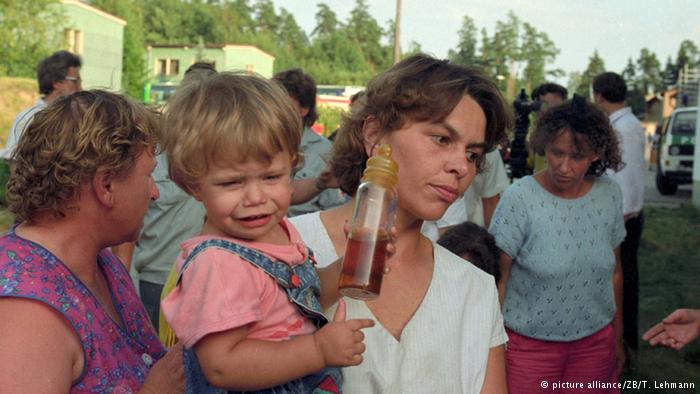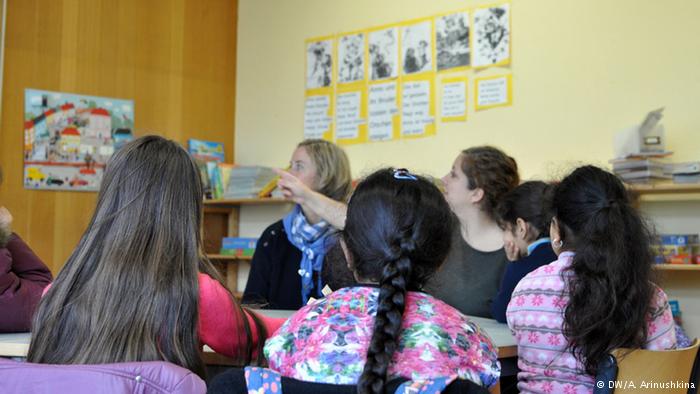Bosnia-Herzegovina
Of of welcome no trace
20 years ago fled over 400,000 people before the Bosnia war to Germany. You came across similar problems such as the asylum seekers from Syria. Makes the German refugee policy the same mistakes?

From 1992 to 1995 were about 400,000 refugees from Bosnia to Germany
The fear of uncontrolled immigration makes wide. In just one year, currents has 440,000 asylum-seekers due to the Bosnienkrieges to Germany. The government is under pressure to act and tightened the asylum. Only political refugees that Germany should be included.
The debate would have been today in the Bundestag can be conducted. They, however, took place already on 26. May 1993. That day changed the German Bundestag, the basic law and introduced the so-called Drittstaatenregelung. After that, refugees will, over a EU-country or a different neighboring country of Germany, the country is not entitled to asylum and cannot be immediately rejected.
It is a Déjà-vu of the German refugee policy, the debates of that time and today run strikingly similar. The initial welcome seems to have vanished, at present revolves in Berlin is all about how the influx of refugees to Germany may be limited.
After your initial oft-quoted phrase: “We can do it”, rowed by Chancellor Angela Merkel before a few days back, and said that Germany will give the most refugees only
temporary protection. They expect the refugees from Syria and Iraq, after the end of the fighting in their homeland returned.
“Guests of time”?
For the Deputy managing Director of the German organisation “ProAsyl” this is a problematic debate on the ill-timed”. “It reminds me of the situation during and after the war in Bosnia-Herzegovina in the’ 90s,” says Bernd Mesovic.
Mesovic stresses that, with the current debate on the legal right of the refugees recognized as such to be graded will become a kind of “hospitality” – just as it did in the case of the refugees from the former Yugoslavia. This do not contribute to Integration.

First, in the school, then back home? – Syrian children in Germany
“Germany, at that time, otherwise treated as the other European States. One has to Bosnian refugees, with a few exceptions, the recognition of refugee status is denied, and you, instead, a temporary protection status is granted. And hardly was the peace agreement of Dayton in 1995 happen, it is said, you have this Status and now is peace, now, but return as soon as possible,” recalls Mesovic.
And as quickly as possible, back it went, because the German policy already at the entry of the refugees unequivocally made it clear that they were during the time of your stay only “tolerated”. According to the former Flüchtlingsbeauftragten the Federal government, Dietmar Schlee, left up to the autumn of 1998, approximately 250,000 Bosnian refugees to Germany. The basis for this was the 1996 agreement signed between Germany and Bosnia-Herzegovina to the gradual Return of the refugees.
“Second exile” from Germany
Mesovic finds it shameful that, at the time, calculated that the United States and Canada, and not Germany or another European country, these people, the Chance for a new life has offered. Some of the refugees said at the time, the pressure to return is a kind of “second expulsion” have been recalled Mesovic.
The editorial recommends
Comment: asylum on time, otherwise it is not!
You expect the Chancellor added that the Syrian war refugees eventually go back home. As at the time the Bosnians. A message, especially to German ears is determined, writes Volker Wagener. (02.02.2016)
A master plan for Integration
A working group consisting of Federal government and the States in the spring of a concept of integration present. Experts call for more investment in the areas of housing, education, work, and language acquisition. Concrete is still not available. (31.01.2016)
“Altmaiers proposal is a Nebelkerze”
What you should do with delinquent become refugees? Kanzleramtschef Peter Altmaier has proposed that refugees in third countries to deport. Attorney Heiko Habbe thinks this is impractical. (01.02.2016)
To Germany and back again
The Federal government relies on the EU to the refugee crisis to solve. But what if the member States continue to walls? Berlin is already working out, asylum seekers back to their homeland to return. (01.02.2016)
Were most of them, in spite of the lack of prospects of remaining at the end of your stay good
integrated, as the 28-year-old Bosnian Jasmina Borojevic. She came with her parents as a small child to Germany and visited there in the 90s, the elementary school.
After the war she returned with her family in her hometown of Modrica in the northeast of Bosnia back. There was later a nurse’s training. Because they have no work took place, she stopped in Germany and found a job as a nurse in a Cologne hospital.
“With my good knowledge of German and I immediately get along, and I felt accepted from the outset”, she says in a DW interview. “Germany, I feel anyway, not as a foreign country, and this has me much easier”, says Jasmina Borojevic.

With Bosnian refugees, many mistakes have been made, says Bernd Mesovic of Pro Asyl
From refugee to professional
It is not unlikely that the history of the Bosnienflüchtlinge repeated. “If the Syria peace ensue, it will certainly, as in the case of former Yugoslavia, many refugees, the return home want,” says Bernd Mesovic. However, it will also be such people, the good reasons would be good to consider, for example, if you have violence or torture is threatened.
Given the uncertain future, argues the Asylexperte, with the Integration as early as possible to begin with. It could be used to the mistakes and detours, the former refugee policy avoid. Because many of the refugee children in Germany growing up and good German languages, were later returned. The second Time they came not as refugees but as students, engineers, or medical professionals – as the Mustereinwanderer, Berlin so desperately desires.
